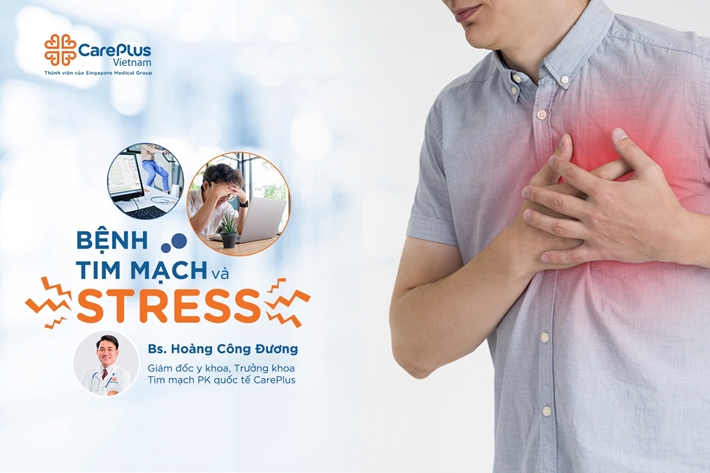Does stress cause cardiovascular diseases?
Stress has become a part of modern life, and almost everyone copes with stress in life more or less. A common question is, can stress cause heart disease?

12/9/2019 11:36:12 AM
So far, despite many studies on this topic, science has not been able to determine exactly how stress causes cardiovascular disease. However, there is no doubt that stress is a risk factor through its direct and indirect effects on the cardiovascular system.
Stress directly affects the amount of hormones in the body such as cortisol and adrenaline that are constantly high and high, this is a harmful effect on the cardiovascular system. Stress can also make the body more likely to form blood clots that block blood vessels, leading to heart attack or stroke.
In addition, stress also adversely affects blood pressure, increases blood sugar and cholesterol levels, and depression makes you lazy to exercise and eat more sloppily.
Cardiovascular problems are the result of stress
Stress can cause or worsen the following heart problems:
-
Angina and coronary stenosis
-
Arrhythmia
-
Hypertension
-
Stroke and cerebrovascular diseases
For people with pre-existing cardiovascular disease, stress can be a driving factor for dangerous cardiovascular events, such as myocardial infarction, stroke, rupture complications, arrhythmias. dangerous heart.
Warning signs when stressed
The human body is a perfect machine, always recognizing and sending us warning signals when the stress level exceeds the tolerance level. The warning signs of symptoms, awareness, behavior, emotions ... to help us know to stop, rest and find ways to overcome before stress has a negative impact on the heart. Signs and symptoms of stress include:
|
Entity markers |
Dizziness, body aches, headache, indigestion, insomnia, heart palpitations, tinnitus, hand sweating, exhaustion fatigue, epigastric pain, weight loss |
|
Psychiatric signs |
Frequent anxiety, quick forgetfulness, inability to concentrate, impaired memory, poor decision-making ability |
|
Emotional signs |
Frustration, anxiety, easy anger, feelings of inhibition, feelings of loneliness, sadness, negative thoughts |
|
Behavioral signs |
Or criticize others, be explosive, change jobs many times, be impulsive, drink a lot of alcohol, reduce communication with friends. |
How to cope with stress?
There are many ways to manage stress, here are some tips to try:
Eat consciously. Even in times of stress, indulgent eating makes it easy to feel comfortable, but it's only a short-term effect. In the long run, uncontrolled eating poses a lot of risk for heart disease and other health problems.
Think for yourself. You do not have to "almost" all, to meet everyone's expectations and wants. Be aware of the limit and say "No", in case it is necessary. Once you realize and care for yourself, ignoring stressful activities will help you to get rid of the imbalance in your life.
Less smoking. For smokers, under stress they tend to smoke more and feel better. In fact, the nicotine in tobacco is a stimulant that both causes additional stress symptoms and is extremely harmful to the phenomenon of atherosclerosis of the whole body.
Exercise regularly. Choose a light, non-antagonistic exercise, and aim to exercise regularly. Aerobic exercises such as gyms, exercise, or cycling are all known to release heart-healthy endorphins and make you feel comfortable.
Know how to relax every day. Relaxation also needs to be learned, not simply sitting down and being quiet. Truly relaxation is an active process of calming the body and mind, meeting the needs of each person's body's peace. Some relaxation remedies are as follows:
-
Breathing: practice abdominal breathing, inhale the belly bulge up and exhale with the abdomen down. Take a slow, slow breath, take a deep breath, and exhale gently. You will feel very relaxed.
-
Relax your muscles: lie comfortably, breathe deeply and breathe slowly. Pay attention to each muscle, wherever you find it tight, relax that muscle. Starting from head to toe, release all the muscles you will find very relaxing.
-
Listen to soothing music. Listening to soothing music that you enjoy can also help relax. You can also try listening to the relaxing music available, such as meditation music, birds singing or waves.
-
Yoga. Try taking a yoga class and doing some exercises at home.
Plan a good time of day for this relaxing activity. Maintain regularity for at least 30 minutes per day.
Get enough rest. Even if you eat and exercise properly, you won't be able to overcome stress without getting enough rest. Our bodies need time to rest, to restore energy and energy. For people who work a lot and under stress, napping is always an effective way to reduce stress and many studies show that napping is beneficial for heart health.
Identify and control the causes of stress.
A lot of people find life too stressful and too little time to do everything. But on reflection, those pressures are chosen and brought in by ourselves, only to feel stress when not fulfilling that requirement.
Know what to prioritize, what's important, and what you can leave behind. Set reasonable expectations in life, even when we are not 100% successful, life is still a worthy experience.
Check heart health.
People who are stressed can have symptoms such as chest pain, suffocating, heart palpitations ... At that time, they worry, panic because they are afraid they have cardiovascular disease. That fear is, in turn, a new type of stress that overlaps the old stress, complicating mental and physical symptoms.
You should have regular heart checkups, to be confident and confident and have a correct understanding of your health. At that time, you can reassure yourself of symptoms occurring entirely from non-cardiovascular causes.